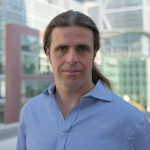Getting started as a contributor to an open source project shouldn't feel like getting bad customer service: "Please hold while we connect you with the first available representative," followed by mind-numbing elevator music on an infinite loop. Nor should new contributors feel they have to scale Mt. Annapurna and go before a wizened greybeard to get their first commit accepted. Too often, junior coders are scared away from open source altogether because everything they do is exposed for all to see.
When I was first starting in open source, after more than a decade of producing closed source, proprietary code for Fortune 500 software companies, I made some (ill-conceived) contribution suggestions to a widely known open source project, and I was taken aback by the abrupt nature of my interactions with the others involved. They were always too busy, or too uninterested, to look at what I was working on, let alone help me.
So what should starting in open source feel like?
We at G-Research are partnering with Major League Hacking (MLH) to bring more coders into open source. We aim to get them started with good, productive experiences so we can build a talent pipeline for the entire open source universe and keep it full for years to come.
MLH started in 2013 as a community for developers that runs hackathons and helps people secure employment. The MLH community is 600,000 strong and sees some 1,000 participants pass through its fellowship programs each year. The MLH Open Source Fellowship runs for 12 weeks and helps new coders get started with key concepts such as submitting pull requests, maintaining projects, and open source best practices.
Finding capable coders isn't easy for employers, and finding new employees empowered to execute on open source can be even more daunting. The Linux Foundation found in a recent survey that 93% of hiring managers had difficulty sourcing sufficient talent with open source experience. The need is particularly acute when it comes to welcoming traditionally underrepresented demographics in tech, such as women and minorities.
Creating good open source code is one thing, but we also see a strong need for maintainers to keep projects nourished and vital. Turnover for maintainers is high by any measure. Tidelift, a company that distributes funds to open source maintainers and connects those maintainers to the companies who use them, reports that 59% of project maintainers have considered quitting. That number is an indication that the experience for those who keep and improve the code needs to be better.
We have a fistful of open source projects ourselves: Armada, a multi-Kubernetes-cluster batch job meta-scheduler; Siembol, a scalable, advanced security analytics framework; and ILGPU, a just-in-time compiler for high-performance GPU programs. There's also the armload of projects we provide our employees time to support as maintainers: Consul.net, Thanos-remote-read, geras, ParquetShop, a Vault plugin database for Aerospike, Apache Ozone, and Fantomas.
These projects are integral components of what G-Research does, and their smooth operation makes our business stronger. Partnering with MLH will help ensure that the open source projects we rely on continue to attract and nurture top talent. We've already seen tremendous success directly within our team, having hired a number of the Fellows from the MLH program to continue working with us on our projects in some capacity.
Indeed, many contributors report that their time working with our engineers was one of the most positive experiences of their careers. And a few have gone on to work for us on our projects. "The best part of this program is getting to learn from the G-Research devs," says Victor Zeddys, an Apache Ozone Fellow. "They were really kind and informative, and I envied their capabilities to handle such a complex project."
And Victor isn't alone. "I had an amazing experience and met lots of great people," says Celina Cywinska, a DevOps Fellow. "I've learned so much about real-world teamwork, and the maintainers shared knowledge I wouldn't have gained in the classroom." Gaining knowledge from your coworkers is one of the most important aspects of employment and can make an especially big difference for those just starting out.
Just as important as the people we have brought to our team is the sense that we are helping seed the wider open source universe with capable, confident open source engineers. "This fellowship has helped me evolve in ways I couldn't imagine," says Christos Bisias, an Apache Ozone Fellow. "It has been an amazing experience working closely with such professionals and learning all kinds of new technologies and best practices."
We're just as proud of the fellows who have come through our program and applied their experience to other projects or employment. We don't have to hire everyone that comes out of the program to benefit from the things MLH teaches and the experiences it equips its graduates with. We know that somewhere down the road, we will all reap the benefit of having a healthy open source talent pipeline from the very beginnings of the open source journey—no mountaineering required.
This article originally appeared on Major League Hacking and is republished with permission.








Comments are closed.